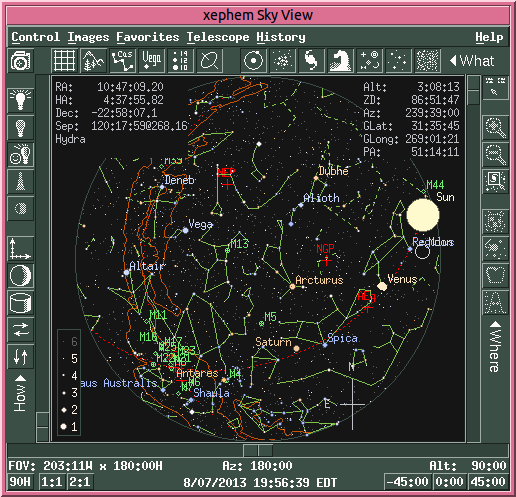Skyfield and 15 Years of Bad APIs
@brandon_rhodes
PyCon Canada
August 2013
Goal
To reflect upon the practice of
Python API design through my recent
work on the Skyfield astronomy library


Elwood Charles Downey et al
1990 Ephem
1993 XEphem
e·phem·er·is — A table
giving the coordinates of
a celestial body at a number
of specific times
CDT 19:00:00 4/30/1990 | LST 8:19:50 |
UTC 0:00:00 5/01/1990 | |
JulianDat 2448012.50000 | Dawn 4:10 |
Watch | Dusk 22:15 |
Listing off | NiteLn 5:55 |
Plot off | NStep 1 |
Menu Planet Data | StpSz RT CLOCK |
---------------------------------------------
OCX R.A. Dec Az Alt H Long H Lat
Su 2:32.3 14:58 278:40 12:38 220:22
Mo 8:09.9 21:11 186:06 65:53 119:55 1:04
Me 2:49.4 17:39 277:48 17:26 214:08 1:43
Ve 23:49.4 -2:25 296:53 -27:39 282:39 -1:30
Ma 22:39.8 -10:09 308:17 -44:14 297:56 -1:43
Ju 6:30.9 23:23 235:13 59:04 106:16 0:08
Sa 19:49.6 -20:53 17:24 -65:14 289:45 0:10

©
XEphem’s author reserves
the right to distribute binaries,
but allows free download of the source
Missing header (.h)
X11/Intrinsic.h: No such file or directory
...
$ apt-file search X11/Intrinsic.h
libxt-dev: /usr/include/X11/Intrinsic.h
Missing library (-l)
/usr/bin/ld: cannot find -lXext
...
$ apt-file search libXext.a
libxext-dev: /usr/lib/i386-linux-gnu/libXext.a

Instead of using a GUI,
I wanted to write scripts
Inside XEphem’s C-language
source code is a computation
engine called libastro
XEphem PyEphem
libastro → libastro
“You have my full permission
to go with what you have.”
— Elwood’s generous reply!
PyEphem = C code
Wrapper around libastro
1998
Beazley’s Simple Wrapper
Interface Generator (SWIG)
SWIG
Exposed awkward details of C structs
body = Obj()
body.any.type = ephem.PLANET
body.pl.code = ephem.SUN
ephem.computeLocation(circum, body)
print ephem.formatHours(o.any.ra, 36000)
print ephem.formatDegrees(o.any.dec, 3600)
2003
Hand-written C that uses
Python 2.2 superpowers
Python 2.2 made attribute
access easy to customize
static PyGetSetDef body_getset[] = {
{"ra", get_ra, 0, "right ascension"},
{"dec", get_dec, 0, "declination"},
{"elong", get_elong, 0, "elongation"},
{"mag", get_mag, 0, "magnitude"},
⋮
}
And, I added a pure-Python wrapper
on top like hashlib, sqlite3, and ssl
# ephem/__init__.py
import _libastro
⋮
More Pythonic
edition of PyEphem
mars = ephem.Mars()
mars.compute()
print mars.ra, mars.dec
But, both interfaces
were still based on C code
and required compilation
Early 2000s
Subject: PyEphem Win32 build errors
Subject: win32, does PhEphem work there too?
Subject: trying to download but I cant unzip it
Late 2000s
Subject: pyephem on Mac PPC
Subject: pyEphem won’t build on Snow Leopard
Subject: PyEphem … Installation error in opensuse
Subject: PyEphem on Ubuntu 10.10
Subject: Pyephem on a 64-bit Win 7 PC?
Mac
Sometimes a problem,
but now on MacPorts!
Windows
python setup.py bdist_wininst
mingw — Open, but quirky
Visual Studio Express — Works!
C extensions
They are difficult to—
- Install
- Distribute
- Maintain
I slowly grew open to the idea
of an alternative approach
An email
“I’m interested in ephemeris options
for astrology apps. You probably know
about the Swiss Ephemeris. Do you know
how it compares in accuracy?”
libastro
Predicts planetary
positions using VSOP87
1987
Swiss Ephemeris
“based upon the DE406,”
the JPL Long Ephemeris
1997
But wait!
# ftp://ssd.jpl.nasa.gov/pub/eph/planets/ascii/
Name Date Modified
⋮
de405/ 10/7/07 8:00:00 PM
de406/ 3/22/11 8:00:00 PM
⋮
de421/ 2/6/13 7:00:00 PM
de422/ 8/3/11 8:00:00 PM
de423/ 3/30/10 8:00:00 PM
⋮
DE421
More recent
More accurate
“planetary navigation accuracies”
Wait—what?
DE421 uses the
“International Celestial Reference Frame”
USNO Circular 179
George H. Kaplan
2005
“The … resolutions passed by
the International Astronomical Union
at its General Assemblies in 1997 and 2000
are the most significant set of international
agreements in positional astronomy in
several decades and arguably since
the Paris conference of 1896.”
Time for a rewrite!
Not a simple re-implementation
But writing, in Python, a complete
replacement of the old algorithms
used throughout PyEphem
Goals
- Replace entire API
- Integrate with scientific Python
- Support vector NumPy computations
- Avoid re-inventing SciPy wheels
Example: Sunrise
PyEphem — custom hand-written
version of Newton’s Method
New approach — an IPython Notebook that
finds sunrise with scipy.optimize
Skyfield
Tools
git
Jedi
py.test
tox
py.test
py.test --pyargs skyfield \
--doctest-glob='*.rst'
py.test
assert c.cal_date(jd) == timescales.cal_date(jd)
I distribute tests
setup(
...
packages=['skyfield', 'skyfield.tests'],
...
)
I distribute docs
setup(
...
package_data = {
'skyfield': ['documentation/*.rst']},
...
)
Licensing
GPL or MIT?
GPL
Free world Closed world
────────── ────────────
Awesome! Less awesome
↑ ↑
Your library → × Alternative?
Rewrite?
MIT/BSD
Free world Closed world
────────── ────────────
Awesome! Closed awesome
↑ ↑
Your library → Your library
(Look closely — Open Source everywhere!)
Free world Closed world
────────── ────────────
Awesome! Closed awesome
↑ ↑
Your library → Your library
This is Python’s own model,
and Python is increasingly everywhere
MIT/BSD
The free kind of freedom is what wins
Technique
single code base
that runs on both
Python 2 and Python 3
Release small projects fast
jplephem
sgp4
Carefully monitor my emotions
Emotions tell me whether
I am programming right
- Frustration?
- Clenching teeth?
- Trapped?
Then I might be doing it wrong
Frustration often signals
inadequate project structure
I notice that tiny goals
are easier to reach and
keep me calm
“Test-driven development is a way of
managing fear during programming.”
— Kent Beck,
Test Driven Development By Example
Version Control
“How soon can I commit
so that I can’t lose what
I’ve just typed?”
Young
“How can I split this task into
smaller pieces for the computer?”
Old
“How can I split this task into
smaller pieces for me?”
Big slog: risks everything!
here →→→→→ new feature
here → • → • → • → • → new feature
Incremental: cheap to revert
Always use git stash
to revert and try again
Aim for a Moon Shot
Write up an end-to-end example
then move straight there
The sins of my APIs
Sin: Inscrutable names
“Explicit is better than implicit”
d = '2012/11/9'
m = ephem.mars(d)
print(m.a_ra, m.a_dec)
# Skyfield, instead:
d = JulianDate('2012/11/9')
p = earth(d).observe(mars).astrometric()
print(p.ra, p.dec)
Sin: storing results on object
mars = ephem.Mars()
mars.compute('2012/11/9')
print(m.ra, m.dec)
# Mars
# .name
# .date
# .compute() →↘
# .ra ↖ ↓
# .dec ←←←←←←←↙
# ⋮
# PyEphem:
positions = []
for date in dates:
mars.compute(d)
positions.append((mars.ra, mars.dec))
# Skyfield:
coords = [mars(d).astrometric() for d in dates]
positions = [(c.ra, c.dec) for c in coords]
Look familiar?
letters = list(set(message_string))
letters.sort()
print ''.join(letters)
# vs
print ''.join(sorted(set(message_string)))
outputs = sorted(inputs)
Making code more functional
is a big part of Pythonic
Sin: Concealing expense
Your API is the only lifeline
the programmer has to managing
complexity and expense!
# PyEphem
m = ephem.mars('2012/11/9')
print(m.name) # zero work
print(m.ra, m.dec) # computed
print(m.rise_time) # expensive!
Guideline
It’s okay to hide quick
conveniences behind properties
But expensive operations
should always look like calls!
mars.name # looks cheap
mars.apparent() # looks expensive!
Use this difference to
train your customers!
# “I can use this over and over again!”
mars.name
# “Looks expensive; I’ll save the
# result to a local name instead.”
mars.apparent()
The big lesson?
Write APIs that TEACH!
Write APIs that teach
You know how your API works
and how it can best be used
Share as much of that
knowledge as possible
Write APIs that teach
While an API should hide complexity
it should also suggest best practices
Write APIs that teach
r = urllib2.urlopen(url) # bad
r = requests.get(url) # good
Why?
r = requests.get(url)
The very first line of requests code
teaches users their first HTTP verb —
without their even knowing it
PyEphem made every coordinate
an attribute — looking exactly the same
with no visible relationship!
mars.a_ra, mars.a_dec # astrometric
mars.g_ra, mars.g_dec # apparent geocentric
mars.ra, mars.dec # apparent topocentric
mars.alt, mars.az # apparent horizontal
Skyfield has you to build a
result from smaller operations
here = toronto(jd)
here.observe(mars).astrometric()
here.observe(mars).apparent().equatorial()
here.observe(mars).apparent().horizontal()
Sin: Confusing functions and methods
Python support both procedural
and object-based methods, but
choosing can be difficult
PyEphem
m = Mars(date)
print(constellation(m.ra, m.dec))
# This function can ONLY EVER be passed
# a right ascension and declination; why
# not make it a coordinate method?
So here are some guidelines
that I have been using lately
- Methods constitute Python’sbuilt-in typecheck — the one cleanway to limit the types that a functionwill accept as an argument
If you are tempted to start a function
with if isinstance(…) then you
might want a method instead!
- f(x) should by definition touchonly public features of an x
If f(x) needs internal details,
then either make it a method itself,
or create a method that does the
internal manipulation for it
- f(x) should by definition notmutate the state of x
(If you need to mutate state from
outside, try the Adapter Pattern!)
PyEphem
m = Mars(date)
print m.ra # prints one thing
toronto.next_rising(m)
print m.ra # something different!
- Methods are discoverable
(Jedi!)
Skyfield: New tricks
What about when you do need
to dynamically compute
an attribute?
class Sample(object):
@property
def loud(self):
return self.message.upper()
Problem: hidden expense
So, we cache
class Sample(object):
_loud = None
@property
def loud(self):
if _loud is None:
self._loud = self.message.upper()
return self._loud
Problem: makes every
access more expensive
Solution: dunder-getattr!
class Sample(object):
def __getattr__(self, name):
if name == 'loud':
self.loud = self.message.upper()
return self.loud
raise AttributeError()
Solution: dunder-getattr
For a value frequently
accessed in heavy numeric
work, __getattr__() runs
only on the first lookup!
Trick: scalar style
NumPy initially excited me
by letting me write scalar code
that also works on arrays!
def f(x, y):
return sqrt(x*x + y*y)
print(f(3, 4))
# => 5
x = array([3, 8, 60])
y = array([4, 6, 80])
print(f(x, y))
# => array([5, 10, 100])
# Number!
jd = today()
p = earth(jd).observe(planet)
# Vector!
jd = date_range('1980/1/1', '2010/1/1', 1.0)
p = earth(jd).observe(planet)
But scalar style is hard to
maintain across a large code base!
n = compute_nutation(jd)
p = compute_precession(jd.tdb)
f = J2000_to_ICRS
t = einsum('jin,kjn->ikn', n, p)
t = einsum('ijn,jk->ikn', t, f)
pos = einsum('in,ijn->jn', pos, t)
vel = einsum('in,ijn->jn', vel, t)
One last hint
Vi Hart says τ = 2𝜋
Q:
Should dunder-init import things?
# __init__.py
from .earthlib import Topos
from .planets import Jupiter
to allow
from skyfield import Topos, Jupiter
Pro
Simple way to surface
your primary interface
Cons
Innocent import skyfield
winds up importing everything
Cons
Imports do not match messages
from skyfield import Topos
print type(Topos)
# => <class 'skyfield.coordinates.Topos'>
Skyfield: decided against
- Not a one-trick-pony library
- Teach package structure
- Can always skyfield.api
Opinionated defaults
Should Skyfield include
an ephemeris by default?
setup(
⋮
install_requires=['de421'],
)
Avoid Contrived tests
How do you test both
branches of the if?
def f(...):
⋮
# 20 lines of code
⋮
if final_decision():
action1
else:
action2
Do not contrive complex calls
to f() that exercise both branches
Instead factor the function
into smaller pieces that can be
exercised separately
Final trick
Choosing a support forum
Mailing list? Web forum?
What happens 4 years later when
someone has the same question?
Answer can be difficult to find
within a long discussion thread
Answers go out of date
Stack Overflow!
- Answer lives on same page
- Out-of-date answers get fixed
The last mile
The last mile
Lesson #1
New GitHub issue
“PyEphem works from ssh but it
does not work from the web”
I was unhappy
- Hurts project reputation
- Issue says “you are wrong”

“Can you help me?”
“This question is not a good
fit to our Q&A format”
“Can you help me?”
yes
import sys
open(
'/tmp/emergency.log', 'w'
).write(
str(sys.path) + '\n'
)
import sys
sys.path.append(
'/home/astronomia/.local/lib64'
'/python2.6/site-packages'
)
It worked
“FYI the support solution is to keep
that emergency code in every script”

“Brandon, thanks a lot for your help.
PyEphem is great.”
The last mile
Lesson #2
October 2012 — I put NOVAS on PyPI
pip install novas
An email
“I have been fiddling around
with NOVAS_Py-3.1 and have
had some problems…”
(a list of bugs followed)
The temptation
Not my library — not my problem
Provide the email address of USNO?
Forward it to them myself?
Assistant Director for Exploration
...@nasa.gov
USNO → me → NASA
The last mile
The last mile
In open source, the
final component of the API
is very often you!
You are the the API of last resort
The last mile
In open source, the
final component of the API
is very often you!
You are the the API of last resort
@brandon_rhodes
Thank you very much!